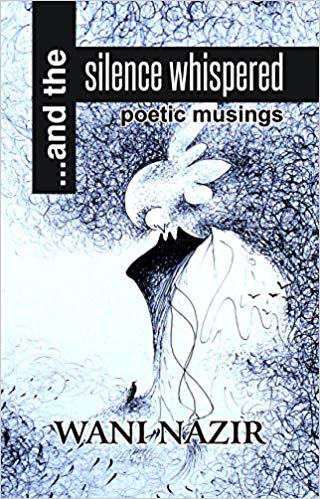And the Silence Whispered, a remarkable debut collection of poems, by Wani Nazir, an educator, poet and reviewer, is not only beautiful as for the diction and form is concerned, but stands unparalleled in terms of numerous perspectives.
The book has a foreword and an introduction written by two distinguished contemporary poets, Santosh Bakaya and Lopa Banerjee, of India, who have sumptuously summed up the overall beauty in the poems. After reading their views about the book, I do not think I can do justice to write about the book, yet there are poems in the book that, I am sure, may compel any lover of poetics and so the case is same here.
The book begins with the poet’s lament over his infertility of creating poetry, yet later, a few lines ahead, he announces that the infertile roots of his poetic tree has received Grace and the tree can yield flowers that can represent his moods, feelings, emotions and the over all impressions of his surroundings the poet has on his psyche. Here is the poem that begins with a lament and ends with a streak of hope:
“Infertile was the womb of my creativity,
The drought had inflicted upon my thoughts…
…Then, one fine dawn, rains came
Plunked heavily on the parched land…
…The rains now ceased and shone the sun,
A harvest of roses and jasmines
Sprouted in profusion all around…
The seeds of ideas germinated,
In the soil of my imaginative land
And it transformed my barren womb
Into a gushing pool of treasure trove,
I dipped my pen in its ink
And filled the tarrying canvas with
The colours, charismatic and beautiful!…..
Reading a poem of Wani Nazir leads a reader walk upon the trails of his childhood:
“The other day, I happened to amble
Along the hem of a nearby field,
Bedecked by a cluster of children;
All of them were flying kites,
Jerking artfully the long spools
Of thread, with their tender fingers;
Joy was dancing on their faces,
Least linked to the world mortal,
All engrossed in the jocund scene;
I was catapulted to my days of yore,
On the wings of fancy so pure;
Plunged into the expansive field,
With my beautiful yellow kite…(Nostalgia)
And at the same time, makes him feel sad:
“… I stood there all alone,
Regretting…” (Nostalgia)
The poem also reminds you of Gabriel Okara’s famous poem, Once Upon A Time, wherein he laments the loss of innocence, the childhood when a human being is free from avarice and crooked nature: the raiment, a human being wears when he leaves past his childhood and steps into a world of “experience”.
As the reader flips the pages, and in the pages, myriad worlds with numerous tales: happy and sad, optimistic and pessimistic, romantic and realistic etc., the poet’s muse takes readers via the route of imagination to his homeland and makes him experience the sorry state of political affairs:
“Ringing the melancholy bell every morning,
The newspaper vendor smites the door
Of my house to drop the morning news
………..
a heap of dead bodies,
A volley of doleful shrieks,
And a few bits of broken vows.(Good Mo[u]rning)
Fed up with all that is happening around: the violence, the bloodshed, absurd circumstances; the poet implores great actors to come back and bring a streak of smile on the lips of helpless souls:
“O Charlie Chaplin!
May your bones, soul and body,
Absorbed by the earth’s bosom,
Fuse together once more!
May you resurrect from your grave!
The stage frantically needs you Come!
Make an entry on the stage,
Come along with Falstaff and other clowns,
And play the Gravediggers Scene,
The whole audience desperately
Pants for the “comic relief”.
Make us laugh,
Let our day not be wasted!”(Charlie Chaplin)
And when they do not return, the longs to be transformed into a birds, so that he can fly to:
“some undiscovered beatific land,
Where earth breeds not
Nettles of animosity and malevolence,
But roses and jasmines
Of love and fraternity…”( From My Terrace I Wish to Fly)
To sum up, Wani Nazir’s poems are well composed. They have an air of resistance in them. Diction used is apt. Metaphor, imagery and other literary devices are sumptuously employed. His poems have indigenous touch and above all, they are spiced with pathos and comic relief.
Qaisar Bashir a translator, author and poet, hails from Kashmir. He has a Master’s Degree in English Literature from Kashmir University. Once Upon A Time, a translation of a Kashmiri novel Akh Dour by BandsiNirdoush, is his debut achievement. His poems have been published in various National and International Journals like The Criterion, Langlit, Muse India, Setumeg and atunispoetry.com. His forthcoming bookThe Cry Of Wounded Souls, a poetry collection, will be out soon.











































